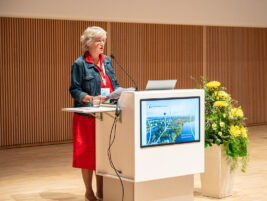This column focuses on the perspectives of clinicians/students who are engaged in infant mental health research at Masters and Doctoral level. It features a sample of current ethically approved research projects. The column aims to highlight the diversity of student research across the globe that is being conducted by WAIMH members, while also providing a global community of interest and support for each student’s research.
This column features three current doctoral research projects being conducted by: Patricia O’Rourke (University of Adelaide, Australia); Lauren Porter (University of Canterbury, New Zealand); and Lucie Zwimpfer (University of Otago, New Zealand).
If you are a WAIMH member/WAIMH student member who is currently engaged in Masters or Doctoral research, and you have ethical approval for your study, we invite you to share a little bit about your study.
Send the text to Assistant Editor Maree Foley (maree.foley@xtra.co.nz ). This would entail providing the following:
Project working title; Name of your institution and department; Names of your supervisors; and A working abstract about your research.
Meeting Your baby: How first-time mothers get to know their newborns – Phase 2 Engagement of midwives in inter-rater reliability testing.
Patricia O’Rourke (University of Adelaide, Faculty of Health Sciences, School of Psychiatry. Women’s and Children’s Health Network, Department of Psychological Medicine, Australia).
A practical typology characterising how firsttime mothers look at their newborn babies was developed in Phase 1 of this project. This was based on a series of 10 minute video sequences of twelve mothers with their newborns within 48 hours of birth. This typology was refined using clinical focus groups of infant mental health and perinatal professionals. Phase 2 of this study aims to achieve inter-rater reliability for the typology. It involves a new participant group of first-time mothers and up to 30 midwives who will be recruited and trained in the use of the typology. They will view the video sequences and be asked to rate them according to the typology. The data will then be analysed using a modification of Cohen’s Kappa for more than two raters (Fleiss, 1971) to assess the level of inter-rater reliability.
Supervisors Professor Jon Jureidini, Child and Adolescent Psychiatrist, Professor Dept of Psychiatry, University of Adelaide. Professor Louise Newman, Child and Adolescent Psychiatrist, Professor of Developmental Psychiatry, Director of Monash University Centre for Developmental Psychiatry and Psychology. Professor David Ben-Tovim, Director, Clinical Epidemiology Unit, Flinders Medical Centre, Professor Faculty of Health Sciences, Flinders University
Mapping Identity and Connection: How first-time mothers make sense of premature birth, create a mothering map and find dyadic connection with their infant.
Lauren Porter (School of Social Work, University of Canterbury, New Zealand).
Winnicot’s famous phrase, “There is no such thing as a baby, only a baby and someone” (Winnicott, 1958), is tested in the experience of the premature infant. In the intensive medicalised environment of the NICU, infants weather not only the impact of hospital procedures and environment, but the separation from mother and the suspension of the getting-to-know-you phase that occurs after birth. Similarly, mothers are in a state of suspension, unable to fully step into their role. Basic questions, such as Stern’s fundamental, “Can I keep this baby alive?” belong not to the mother but to medical staff. In the midst of this, little information exists about the meaning of this experience for the mother and for her relationship with her baby.
This PhD research is a qualitative study of first time mothers and the meaning they make of the experience of giving birth prematurely. How do mothers and their premature infants make meaning and sense of the experience of prematurity? What is the nature of the interpersonal process that occurs between a mother and her premature infant, especially in light of the separation and hospitalisation experience? How do mothers come to know themselves as mothers? How do they understand and come to know their infants? The research focuses on a set of approximately 15 semistructured interviews with New Zealand mothers who birthed primarily in New Zealand, but also in Europe and Australia. Data is analysed within the framework of Interpretative Phenomenological Analysis.
Winnicott, D. W. (1958). Through Paediatrics to Psycho-Analysis. London: Hogarth Press.
Supervisors Associate Professor Kate van Heugten (Department of Human Services and Social Work, University of Canterbury, New Zealand) and Dr Patricia Champion (MBE) (Founder and Clinical Director Emeritus of the Champion Centre, Christchurch, New Zealand).
Talking to babies in a neonatal intensive care unit: The impact of verbal soothing on measures of infant stress during heel prick procedures.
Lucie Zwimpfer (The Department of Paediatrics and Child Health, University of Otago, Wellington, New Zealand).
Preterm infant exposure to pain and stress is associated with adverse physical and emotional outcomes. The Neonatal Intensive Care Unit (NICU) is increasingly being seen as a place for the emotional and developmental care of the infant in addition to their physical care.
This PhD research project investigates whether non-parental vocal soothing, together with an attuned emotional presence, can reduce the physiological and behavioural manifestations of stress for preterm infants during painful procedures.
Sixty-three infants born between 32 and 35 weeks gestation and in their first 2-10 days of life are assigned to two conditions (voice or silent) in random order. In the voice condition, infants are offered attuned vocal soothing by a psychotherapist during a routine heel prick procedure. In the silent condition the same procedure is performed without vocal soothing. Behavioural measures of stress are recorded using the Premature Infant Pain Profile (PIPP) and physiological measures of stress include salivary cortisol, heart rate variability and oxygen saturation.
This research is currently at data gathering stage.
If attuned empathic vocal soothing is found to be an effective mitigator of preterm infant stress it will provide evidence for a relationship based, non-pharmacological, cost-effective intervention that may mean that the infant’s emotional needs are more effectively met in the NICU.
Supervisors Professor Dawn Elder (The Department of Paediatrics and Child Health, University of Otago, Wellington, New Zealand); and Associate Professor Esko Wiltshire (The Department of Paediatrics and Child Health, University of Otago, Wellington, New Zealand).
A New Column on Scientific Studies: Perspectives from Masters and Doctoral Students
Authors
Foley, Maree,
New Zealand








